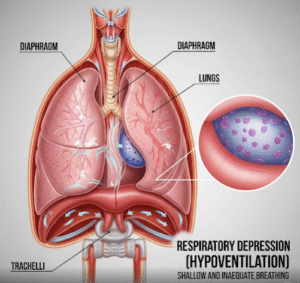Overview
Obesity is a complex, chronic medical condition characterized by excessive body fat accumulation that negatively impacts health. It increases the risk of numerous diseases, including heart disease, diabetes, hypertension, stroke, and certain cancers. Obesity is not only a result of overeating or lack of physical activity but also influenced by genetics, metabolism, environment, behavior, and hormonal factors.
It is a global health epidemic, affecting people of all ages and socioeconomic backgrounds. Effective management requires a multidisciplinary approach involving lifestyle changes, medical support, and, in some cases, surgery.
What is Obesity?
Obesity is typically measured using the Body Mass Index (BMI), a calculation of weight in relation to height.
- BMI 25.0–29.9: Overweight
- BMI ≥ 30.0: Obese
- Class I: 30.0–34.9
- Class II: 35.0–39.9
- Class III (Severe/Morbid Obesity): ≥ 40.0
However, BMI is not a perfect measure and may be supplemented with other indicators such as waist circumference, body fat percentage, and comorbidities.
Obesity can be categorized into:
- General obesity: Whole-body fat accumulation
- Abdominal obesity: Central fat accumulation, a greater risk for cardiovascular disease
Symptoms
Obesity itself may not cause specific symptoms, but it contributes to a wide range of physical and psychological issues:
- Excess body weight
- Shortness of breath with exertion
- Fatigue and low energy
- Joint and back pain
- Increased sweating
- Snoring or sleep apnea
- Skin disorders (e.g., rashes in folds)
- Depression, low self-esteem, or social isolation
Obesity also significantly increases the risk of developing secondary health conditions.
Causes
Obesity results from a long-term energy imbalance—consuming more calories than the body burns. However, the causes are multifactorial:
- Poor diet: High intake of fast food, sugary drinks, and processed snacks
- Lack of physical activity
- Genetic factors affecting metabolism and fat storage
- Hormonal imbalances (e.g., hypothyroidism, Cushing’s syndrome)
- Medications: Antidepressants, steroids, antipsychotics
- Psychological factors: Stress, emotional eating, depression
- Sleep deprivation
- Sedentary lifestyle (long screen time, desk jobs)
Risk Factors
Several factors increase the risk of becoming obese:
- Family history of obesity
- Unhealthy eating habits from a young age
- Low socioeconomic status (limited access to healthy food and fitness resources)
- Age – metabolism slows over time
- Pregnancy and post-pregnancy weight retention
- Hormonal or metabolic disorders
Complications
Obesity is a major risk factor for many serious and potentially life-threatening diseases:
- Type 2 diabetes
- High blood pressure (hypertension)
- Heart disease and stroke
- High cholesterol and triglyceride levels
- Sleep apnea and breathing problems
- Fatty liver disease (NAFLD)
- Gallbladder disease
- Osteoarthritis
- Certain cancers: breast, colon, endometrial, liver
- Infertility and sexual dysfunction
- Mental health disorders (depression, anxiety)
- Reduced quality of life and life expectancy
Prevention
Obesity is preventable through sustained lifestyle changes:
- Balanced diet: Rich in fruits, vegetables, whole grains, lean protein
- Limit sugar, refined carbs, and saturated fats
- Regular physical activity (at least 150–300 minutes per week)
- Portion control and mindful eating
- Avoid sedentary behavior (long sitting, excessive screen time)
- Adequate sleep (7–9 hours per night)
- Stress management techniques (meditation, hobbies, social support)
- Education and awareness from an early age
- Routine health checkups for weight monitoring and metabolic health
Treatment Options in Korea
South Korea offers comprehensive, state-of-the-art obesity care programs combining medical, surgical, and lifestyle therapies. Multidisciplinary clinics are available at major hospitals.
1. Medical Evaluation
- BMI and body composition analysis
- Blood tests for glucose, cholesterol, liver/kidney function, thyroid hormones
- Assessment of metabolic syndrome and related diseases
2. Lifestyle Modification Programs
- Personalized diet plans from clinical dietitians
- Exercise therapy with physical trainers or physiotherapists
- Behavioral counseling for eating habits and psychological triggers
- Group therapy and patient education sessions
3. Medication Therapy
- Anti-obesity medications (as prescribed) such as orlistat, liraglutide, or semaglutide
- Medications are usually recommended for BMI ≥ 27 with comorbidities or BMI ≥ 30
4. Bariatric Surgery
Indicated for patients with BMI ≥ 35, or BMI ≥ 30 with serious complications:
- Gastric sleeve surgery (sleeve gastrectomy)
- Gastric bypass surgery
- Intragastric balloon insertion (less invasive option)
- Laparoscopic or robotic-assisted procedures
Korea is renowned for minimally invasive bariatric surgery, with high safety standards and excellent outcomes.
5. Obesity Clinics and Hospitals in Korea
Top institutions include:
- Samsung Medical Center – Obesity and Metabolic Clinic
- Asan Medical Center – Comprehensive Bariatric Program
- Severance Hospital (Yonsei University) – Lifestyle and Weight Management Clinic
- Seoul National University Hospital – Obesity Center
- 365mc Hospital – Korea’s largest private obesity-specialized network
These centers provide:
- Multidisciplinary teams (endocrinologists, nutritionists, surgeons, psychologists)
- Cutting-edge technology and surgical expertise
- Personalized care plans
- English-speaking staff for international patients













